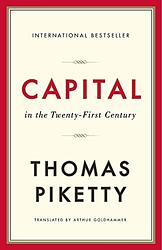Capital in the Twenty-First Century by Thomas Piketty
This book provides a comprehensive analysis of the dynamics of capital accumulation and distribution over the last few centuries. The author argues that the rate of capital return in developed countries is persistently greater than the rate of economic growth, leading to high levels of wealth inequality. The book further suggests that the level of income inequality is not primarily a result of differences in individual labor income but rather the result of differences in capital ownership and the income derived from it. The author proposes a global tax on wealth to prevent soaring inequality.
The 6884th greatest book of all time
Ranking Details:
Our ranking system awards points to books based on their appearance and position on curated lists. Here's how it works:
Unranked Lists: For lists without specific rankings, each book receives points equivalent to the list's weight. This approach recognizes the book's inclusion on prestigious lists.
Ranked Lists: Books on ranked lists receive points in two ways:
- Base Points: Initially, every book is awarded points equal to the list's weight, acknowledging its significance.
- Bonus Points: Additionally, books earn bonus points based on their ranking. The total bonus pool, equal to 100% of the list's weight, is distributed among the books, with higher-ranked books receiving more points.
Exponential Distribution: The distribution of bonus points follows an exponential model. This means the top-ranked book (#1) receives significantly more bonus points than those further down the list (e.g., #100). Our algorithm ensures that higher placements are rewarded more generously, reflecting the achievement of a top rank on any given list.
This scoring system ensures that each book's ranking reflects both its presence on multiple lists and its positions within those lists, providing a comprehensive measure of its acclaim and popularity.
Total Points: 155
Since this book was first published in 2013, there is a penalty of 62.4%. The age adjusted score is 58.28.
This is to prevent newer books from reaching super high on the ranked list of the greatest books of all time. The greatest books should also stand the test of time.
- score: 81 -- Bill Gate's Book Recommendations (Weight: 81)
- score: 74 -- The 100 best books of the 21st century (Weight: 72)

